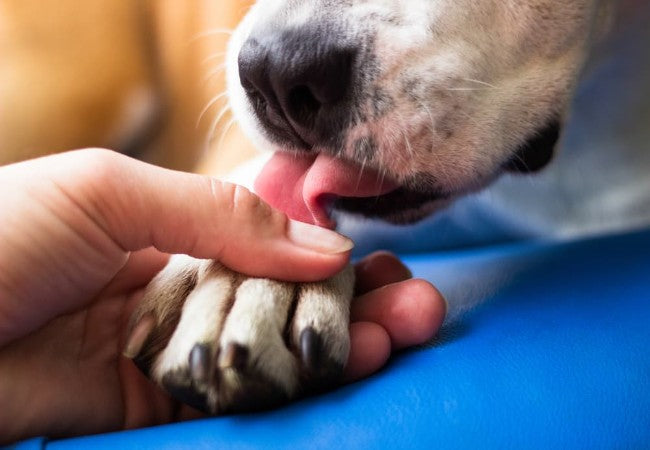Veterinary Guide to Canine Interdigital Cysts 2025 🩺🐶

In this article
Veterinary Guide to Canine Interdigital Cysts 2025 🩺🐶
By Dr. Duncan Houston BVSc
🧬 What Are Interdigital Cysts?
Interdigital cysts—also called interdigital furuncles or folliculitis—are painful nodules that develop between a dog’s toes, stemming from ruptured hair follicles or foreign bodies, leading to deep inflammation and often secondary bacterial infection.
👥 Who’s at Risk?
- Short-coated, large breeds: Bulldogs, Boxers, Labradors, Pit Bulls, German Shepherds, due to coarse hair and foot conformation.
- Dogs with wide, webbed toes or excess paw friction—splayed feet amplify trauma.
- Obesity and arthritis: increased pressure causes follicular trauma.
- Underlying skin disease: atopy, demodex, grass awns, hypothyroidism, Cushing’s.
👀 Clinical Signs
- Painful red or purple bumps, often with pus or bloody discharge.
- Limping, foot lifting, and discomfort while walking.
- Excessive paw licking/chewing; hair loss, foul odor if infected.
- Multiple lesions are common; recurrent flare-ups are possible.
🔍 Diagnostic Approach
- History & exam: Look for foot trauma, environment, underlying allergies, or endocrine disease.
- Cytology/culture: Swab or aspirate discharge to identify bacterial or fungal infection.
- Skin scraping/mites: Rule out demodex-driven folliculitis.
- Allergy & endocrine testing: Food trial or skin test; blood work for thyroid, Cushing’s, infection.
- Biopsy: For persistent or atypical lesions to exclude tumors or immune disease.
🛠️ Treatment Strategies
1. Medical Management
- Systemic antibiotics: Often 4–8 weeks targeting deep pyoderma.
- Topical therapy: Paw soaks with chlorhexidine/bleach; combined steroid‑antibiotic ointments or sprays.
- Pain/inflammation: Short‑term NSAIDs or analgesics; pentoxifylline aids perfusion and lowers inflammation.
2. Advanced & Surgical Options
- CO₂ laser therapy: Vaporizes cyst, leaving minimal healthy tissue damage; may require repeat sessions.
- Surgical excision: Removes webbing; can alter paw shape and requires careful postoperative bandaging.
📈 Recovery & Prevention
- Medical cases may need months for full resolution; chronic flare-ups require maintenance therapy.
- Reduce paw trauma—avoid gravel, wire kennels, and long grass.
- Weight control and arthritis management to reduce pressure.
- Regular paw care: keep dry, clean, hair trimmed between toes, and inspect frequently.
- Maintain allergy management: medications, diets, and environmental control.
📱 Ask A Vet Telehealth Support
- 📸 Upload paw photos to monitor lesion progression or recurrent bumps.
- 🔔 Receive reminders for antibiotics, topical soaks, or follow-up checks.
- 🩺 Schedule a follow-up cytology review virtually to adjust treatment.
🎓 Case Spotlight: “Max” the Boxer
Max, a 5‑year‑old Boxer, developed painful purple nodules between his front toes and began limping. Cytology showed Staph infection; skin scrapings ruled out mites. After 6 weeks of oral antibiotics, daily chlorhexidine soaks, and short course NSAIDs, lesions resolved. He then had two CO₂ laser treatments to remove residual nodules and started weight loss. Ask A Vet reminders helped with treatments and check-ins. At last follow-up, Max remains cyst‑free for 8 months 🌟.
🔚 Key Takeaways
- Interdigital cysts are deep follicular lesions driven by friction, trauma, infection, or allergy.
- Diagnose via cytology, culture, scraping, endocrine and allergy investigation.
- Treat with long-course antibiotics, topical care, anti-inflammatories, and advanced interventions like lasers or surgery.
- Prevention focused on paw protection, weight control, allergy management, and hygiene.
- Ask A Vet telehealth supports every step—from lesion monitoring to medication delivery and dietary coaching 📲
Dr Duncan Houston BVSc, founder of Ask A Vet. Download the Ask A Vet app today to support your dog’s interdigital cyst journey—from accurate diagnosis, complete treatment planning, to remote healing assessments and prevention guidance 🐶📲






